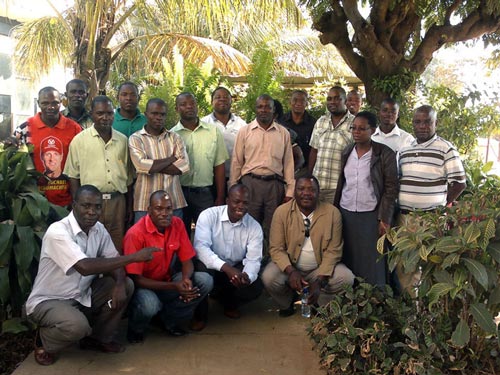 For the past three years the SIMLESA project has been working towards its target of improving maize/legume productivity by 30 percent and reducing downside risk by 30 percent. Over a ten-year span, the project hopes to impact 100,000 farmers with conservation agriculture (CA) and maize/legume technologies.
For the past three years the SIMLESA project has been working towards its target of improving maize/legume productivity by 30 percent and reducing downside risk by 30 percent. Over a ten-year span, the project hopes to impact 100,000 farmers with conservation agriculture (CA) and maize/legume technologies.
One of SIMLESA’s key objectives is to increase the uptake of CA and maize/legume technologies amongst smallholder farmers in Mozambique. Mozambique remains one of the countries in southern Africa with low average maize yields (0.73 t/ha) due to low uptake of fertilizer (<4%) and improved maize varieties (<10%), impacting both food security and incomes.
To address these issues, key private sector stakeholders and NGOs met in Chimoio, Mozambique, on 20 August 2012. Among the topics discussed was how best to strengthen innovation platforms and partnerships to further disseminate SIMLESA activities among smallholder farmers, a subject highlighted in the opening speech by David Mariote, Central Region Director of the Instituto de Investigação Agrária de Moçambique (IIAM).
SIMLESA highlights to date were expounded by Isaiah Nyagumbo, Cropping Systems Agronomist, and Munyaradzi Mutenje, Agricultural Economist, from CIMMYT’s Southern Africa Regional Office, and Domingos Dias, Senior Agronomist and SIMLESA Coordinator at IIAM. Achievements include CA trials and treatments established in the provinces of Manica (Manica and Sussundenga districts), Sofala (Gorongosa district), and Tete (Angonia district). The trials focus on testing CA-based rotations/ intercrops of maize with common beans or cowpea. Different crop establishment methods using CA equipment such as animal traction direct seeders and rippers, and manual traction seeders, such as jab planters, are also being tested. Work on seed development has been accelerated through the seed road map via seed multiplication and participatory variety selection activities that actively involve farmers’ associations such as IDEAA-CA.
The meeting was attended by 25 participants from 15 institutions. Stakeholders included agrodealers (seed houses and fertilizer suppliers), NGOs (International Fertilizer Development Centre and Total Land Care), and financial and academic institutions.
The participating institutions expressed great interest in providing a platform for SIMLESA’s current and future objectives in new communities. Most of the planned joint initiatives are expected to be formally launched during the next SIMLESA Annual Review and Planning Meeting scheduled for 3-4 September 2012 in Chimoio, Mozambique.
 Innovations
Innovations